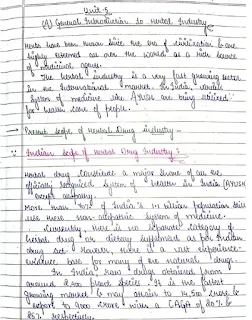Regulatory Issues: Hand Written Notes
Regulatory Issues
Regulations in India (ASU DTAB, ASU DCC)
Regulation of manufacture of ASU drugs - Schedule Z of Drugs & Cosmetics Act for ASU drugs
Detailed Explanation
The regulatory framework for Ayurveda, Siddha, and Unani (ASU) drugs in India is overseen by various bodies and guidelines to ensure the safety, efficacy, and quality of these traditional medicines. The key regulatory bodies involved include the Ayurvedic, Siddha, and Unani Drugs Technical Advisory Board (ASU DTAB) and the Ayurvedic, Siddha, and Unani Drugs Consultative Committee (ASU DCC).
The ASU DTAB is responsible for advising the central and state governments on technical matters related to the manufacture and regulation of ASU drugs. The ASU DCC, on the other hand, provides a platform for central and state authorities to coordinate and advise on the implementation of regulations concerning ASU drugs.
The regulation of the manufacture of ASU drugs is primarily governed by Schedule Z of the Drugs and Cosmetics Act. Schedule Z outlines the specific requirements for the manufacturing process, quality control, and standardization of ASU drugs. This includes guidelines on the proper identification and authentication of raw materials, adherence to Good Manufacturing Practices (GMP), and ensuring that the final product meets the prescribed standards of safety and efficacy.
Furthermore, the Drugs and Cosmetics Act mandates that ASU drug manufacturers must obtain a license from the licensing authority, which ensures that the manufacturing facilities comply with the necessary regulatory requirements. This licensing process includes regular inspections and audits to verify compliance with GMP and other regulatory standards.
In addition to national regulations, there are also international guidelines that may apply to the assessment and regulation of herbal drugs. These guidelines, such as those provided by the World Health Organization (WHO) and the International Council for Harmonisation of Technical Requirements for Pharmaceuticals for Human Use (ICH), offer a framework for ensuring the quality, safety, and efficacy of herbal products on a global scale.
Overall, the regulatory framework for ASU drugs in India aims to uphold the integrity of traditional medicine systems while ensuring that these products are safe and effective for public use. By adhering to these regulations, manufacturers can contribute to the continued trust and acceptance of ASU drugs in the healthcare system.
Info!
If you are the copyright owner of this document and want to report it, please visit the copyright infringement notice page to submit a report.

